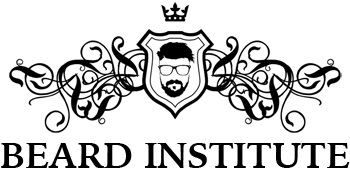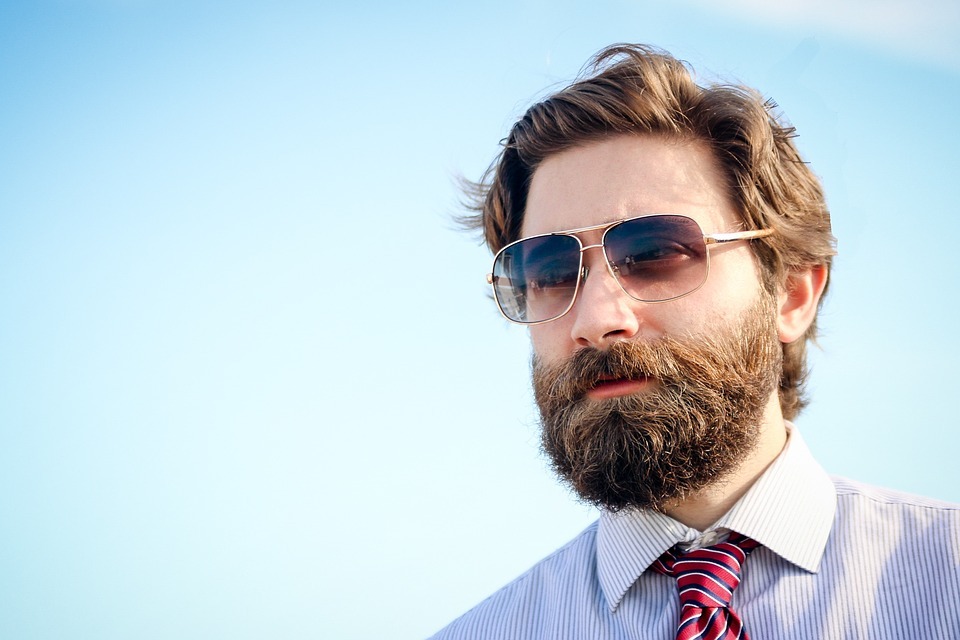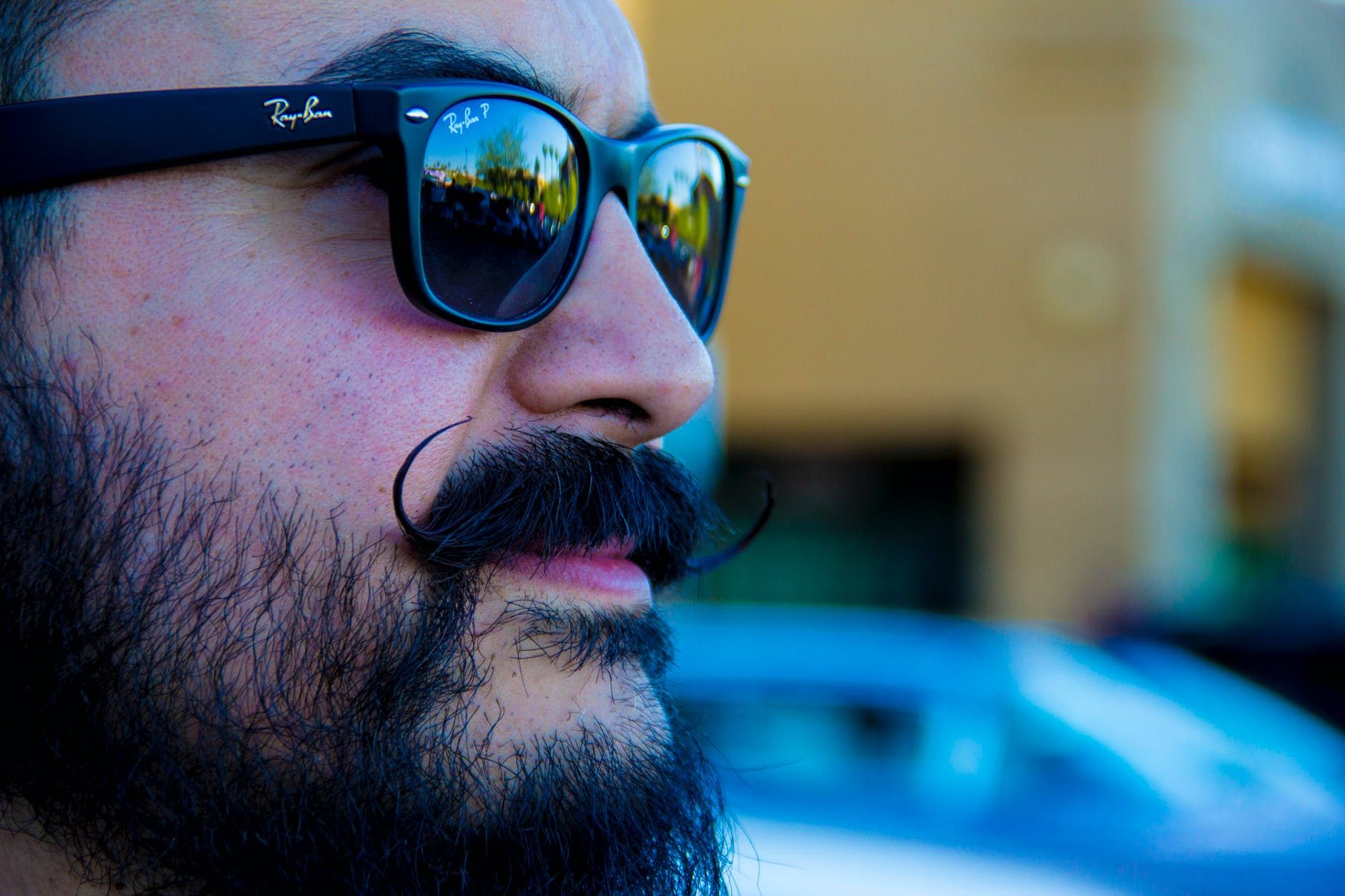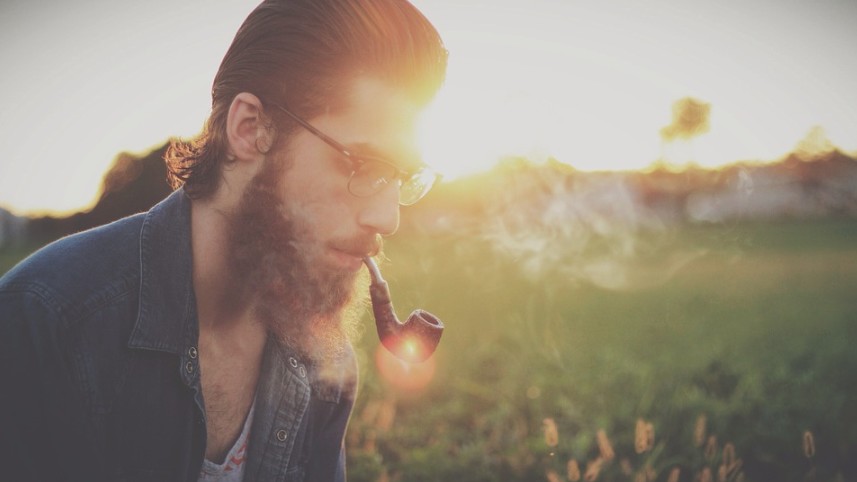Should I Grow a Beard or a Mustache?
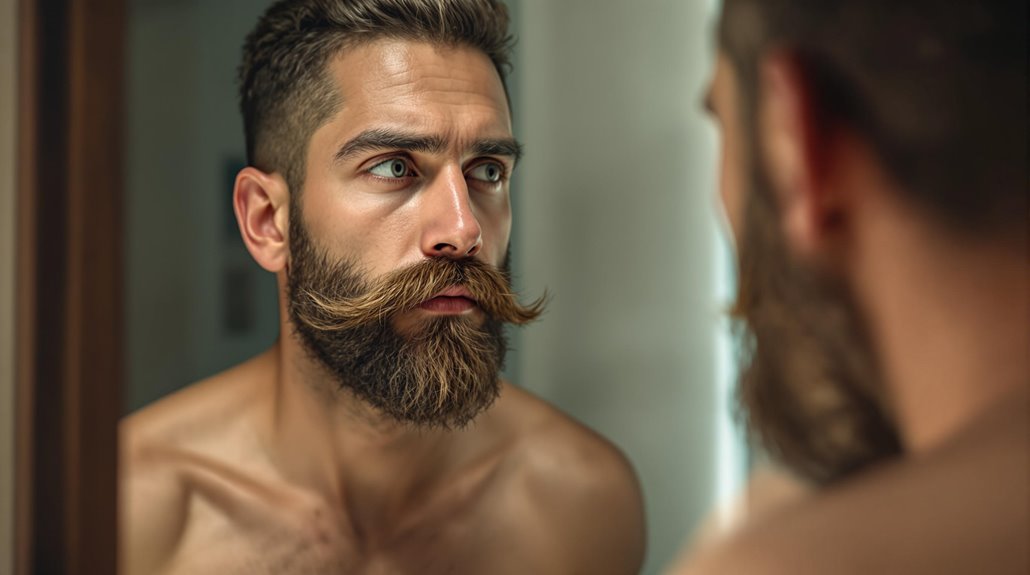
Choosing to grow a beard or a mustache depends on your personal preference, comfort, and the impressions you want to make. Historically, both have symbolized masculinity and wisdom, and they continue to offer ways to express individuality. Mustaches may require more grooming and spark different reactions, while beards are generally low-maintenance and shield your skin from harmful UV rays. Consider how you'd feel sporting different facial hair styles and the potential societal perceptions. As you investigate further, you'll uncover more insights into this fascinating topic, assisting in making an informed, positive decision.
Facial Hair: A Historical Overview
Diving into the timeline of facial hair, you'll uncover its roots reaching back to prehistoric times. Evidence points to early humans grooming their beards as far back as 2.5 million to 10,000 years ago. The beard's legacy, though, is not just about time - it's also a symbol of wisdom and masculinity.
Throughout history, the popularity of facial hair, specifically beards, has fluctuated. However, they've always maintained a consistent presence across diverse cultures. The Elizabethan Period, for example, saw a spike in mustache popularity, thanks in part to influential figures like King James I and King Charles I. But the beard held its ground, often seen as the superior choice over the mustache.
Your perception of facial hair, especially beards, is shaped by this rich history. Today, beards are seen as a mainstream grooming choice, while mustaches remain more divisive. What's undeniable is the enduring symbolism and cultural significance of the beard. The question of whether to grow a beard or a mustache isn't just about fashion or personal preference - it's about tapping into a tradition that spans millennia.
Mustaches: Styles and Perceptions
Regarding mustaches, the range of styles is as diverse as the opinions surrounding them. You could opt for a classic Chevron, flaunt a flamboyant handlebar, or sport a sophisticated Van Dyke. Each style comes with its own unique aesthetics and cultural associations.
But be aware, mustaches tend to be less mainstream than beards. They evoke strong responses, with people either loving or loathing them intensely. Your mustache can carry preconceived notions about your character and even influence how others perceive your masculinity and grooming choices.
Proper grooming and maintenance are crucial when you're wearing a mustache. Specialized products like mustache wax are recommended for shaping and styling. So, if you're up for a little extra grooming effort, a mustache could be a great choice.
While mustaches may not provide the same transformative impact as full beards, they can serve as a stepping stone. If you're exploring facial hair styles, starting with a mustache could be your perfect launchpad. Remember, your mustache is not just facial hair; it's a statement, a reflection of your personality. So, choose wisely!
Pros and Cons of Mustaches
Having a mustache indeed comes with its own set of pros and cons. When you decide to grow a mustache, you're signing up for a unique facial hair experience that's unlike any other.
Among the positives, a mustache allows you to showcase your individuality. With a variety of styles, from the classic Handlebar to the more sophisticated Van Dyke, the mustache provides a canvas for personal expression. It's also a conversation starter, often igniting passionate discussions for admirers and critics alike.
On the flip side, the decision to grow a mustache comes with challenges. Maintaining a mustache requires specialized grooming products and techniques. Without the right care, your mustache may appear less polished. Furthermore, mustaches can evoke polarized opinions, and might be considered less mainstream than beards.
Consider these aspects when you're deciding to grow a mustache:
- Mustaches offer diverse style options
- They require specialized care and grooming
- They can evoke strong, often polarized, opinions
Beards: An In-Depth Look
From the rugged to the refined, beards, throughout history, have been seen as a sign of masculinity, wisdom, and reliability. Not only do they symbolize maturity and experience, but they also require minimal effort to grow. You simply let your facial hair grow naturally without shaving, which makes them a low-maintenance grooming option.
But remember, beards aren't just about aesthetics. They come with several health benefits. They can protect you from harmful UV rays, allergens, and skin irritations, while also helping retain skin moisture. To guarantee your beard stays soft, doesn't itch, and promotes comprehensive skin health, regular washing, trimming, and the use of oils are necessary.
Culturally, the significance of beards varies across societies, reflecting changing norms and values. However, current trends show an increased acceptance of diverse beard styles in fashion. So, if you've been contemplating if to grow facial hair, a beard might just be the right choice for you. But, it's not just about growing it, it's about maintaining it. In the end, it's your style, your decision.
Benefits and Drawbacks of Beards
Choosing to rock a beard comes with a host of benefits, not least of which is the potential health improvement. If you decide to grow a beard, you're opening yourself up to a world of benefits, including some you might not have contemplated:
- Your beard can act as a natural sunblock, reducing your exposure to harmful UV rays by up to 95%.
- Regular grooming of your beard promotes better skin health, warding off skin conditions like acne and eczema.
- A beard can elevate your perceived masculinity and maturity, which can enhance your self-esteem and confidence.
But it's not all sunshine and roses. There are a few drawbacks to weigh. For one, beards require regular grooming to maintain a clean and healthy look. In addition, while beards are more mainstream than mustaches, not all work environments are beard-friendly. Finally, growing a beard can be a test of patience, especially if your facial hair grows slowly.
Despite these potential drawbacks, the decision to grow a beard can be an enriching one, offering you a chance to express your style and personality in a unique way.
Significant Roles of Beards in History
Ever wondered about the historical significance of beards? Well, let's take a trip down memory lane. Since ancient times, beards have been much more than just facial hair. They tend to symbolize masculinity and wisdom. Just think about Socrates or Confucius, their beards were not just style statements but they added to their persona of being wise and authoritative leaders.
In ancient Egypt, beards were more than a fashion statement. They were a status symbol. The nobles would often adorn their beards with gold, making them a flashy symbol of nobility. Beards tend to display a sense of power and virility, a notion that was particularly prevalent during the Elizabethan period. This concept greatly influenced men's grooming habits across Europe.
Fast forward to the 19th century, and beards made a powerful comeback. The Victorian period saw beards as potent symbols of masculinity, leading to an array of styles that became popular in society. So, you see, beards have played a significant role throughout history, and they're not just about personal grooming.
Society's View on Facial Hair
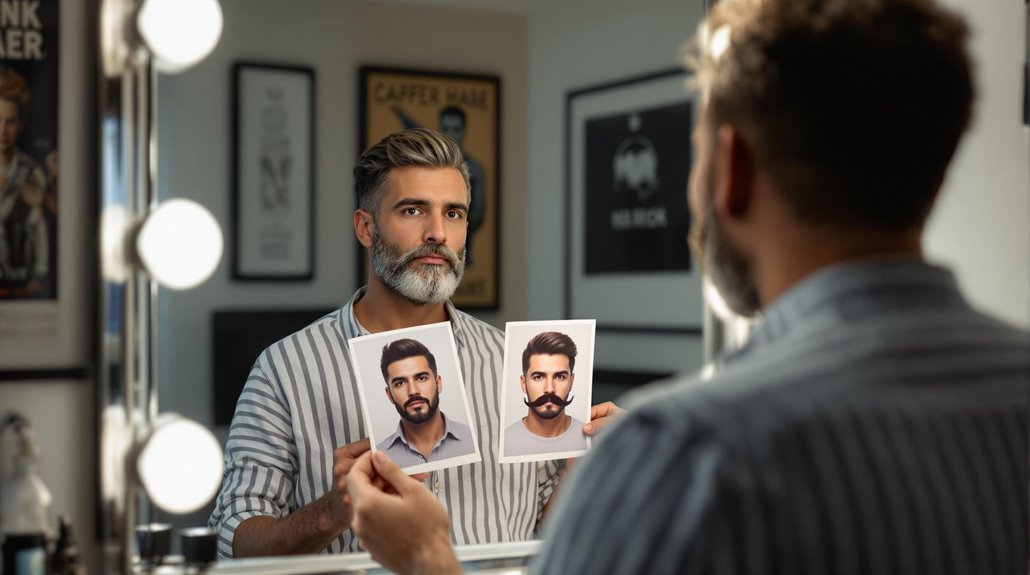
While the historical significance of beards paints a vivid picture of their role, society's view on facial hair offers another interesting perspective. You've probably noticed how recent trends lean towards grooming and shaving, with many men now favoring trimmed looks over full beards. But don't be fooled. The full beard still holds sway in the societal psyche, often associated with qualities like reliability, protection, and capability.
In contrast, those without beards often face stereotypes of inexperience and instability. It's a perception that can impact your social interactions and the way others see you.
Here are some key points society often associates with facial hair:
- Full beards symbolize power, wisdom, and masculinity in many cultures.
- Non-bearded men are frequently perceived as lacking stability and experience.
- Recent grooming trends show a shift towards trimmed or clean-shaven looks.
It's fascinating to see how much weight society places on your choice to grow a full beard or not. However, remember it's your face, your choice. Make the decision that suits your style and comfort best.
The Mustache and Beard Debate
In the domain of facial hair, steering through the debate between beards and mustaches can feel like an expedition through a maze. You might find yourself grappling with societal perceptions and personal preferences, all the while pondering the path to grow your own unique style.
Beards often command a sense of masculinity. They're seen as the full-bodied, sugar-free alternative to the lighter mustache. Society has linked beards with wisdom and authority, making them a popular choice for those wanting to project a confident image. Mustaches, however, have been assigned a lesser status in the facial hair hierarchy.
Despite this, mustaches offer a wide array of styles, providing a playground for your creativity. But, be warned: they tend to polarize opinions. While some admire their uniqueness, others might form preconceived notions about your character based on your mustache alone.
One significant aspect to reflect upon is the perceived disrespect of removing a beard, emphasizing the necessity of embracing full facial hair. Ultimately, the decision to grow a beard or a mustache is personal. Tread carefully through this maze, keeping in mind societal attitudes, personal preferences, and the commitment required.
Cultural Implications of Facial Hair
Exploring the cultural implications of facial hair, you'll find beards have historically symbolized wisdom, masculinity, and social status across diverse cultures. Ancient leaders and philosophers often sported beards as signs of authority. In the present world, a full, healthy beard is considered a reflection of rugged masculinity, shaping perceptions of strength and virility.
In your expedition to understand the cultural significance of a beard, consider these points:
- In some religions, such as Islam, beards are seen as a sign of piety and manhood.
- The modern trend of full beards reflects a shift in societal norms, where they're now seen as a form of personal expression.
- Events like No-Shave November foster a sense of community, promoting men's health awareness while highlighting the cultural significance of facial hair.
Choosing to grow a beard isn't just about aesthetics or personal preferences. It's also a proclamation that connects with cultural, religious, and societal norms. Regardless of whether you're aiming for a rugged look or expressing your individuality, your healthy beard is more than just facial hair – it's a part of your identity.
Health Benefits and Psychological Effects of Beards
Ever thought about the perks of sporting a beard? Well, growing a beard can be more than a style statement. Beards can protect your skin from up to 95% of harmful UV rays, reducing your risk of skin cancer. The shield of facial hair also serves as a barrier against allergens and pollutants, potentially preventing skin conditions like acne and eczema.
Your beard's role doesn't stop at physical health benefits. It also plays a part in how others perceive you. Studies suggest that men with beards are seen as more masculine and mature, enhancing your self-esteem and confidence.
Moreover, growing a beard lets you express your individuality. It's a canvas for your personal style and identity. It's also a great way to retain natural skin oils. By preventing dryness and flaking, you're contributing to healthier skin beneath your beard.
Don't forget the importance of beard oil in maintaining your beard. It moisturizes the skin beneath, reducing itchiness and promoting healthy growth. The psychological effects and health benefits of beards might just make you reconsider your grooming routine.
